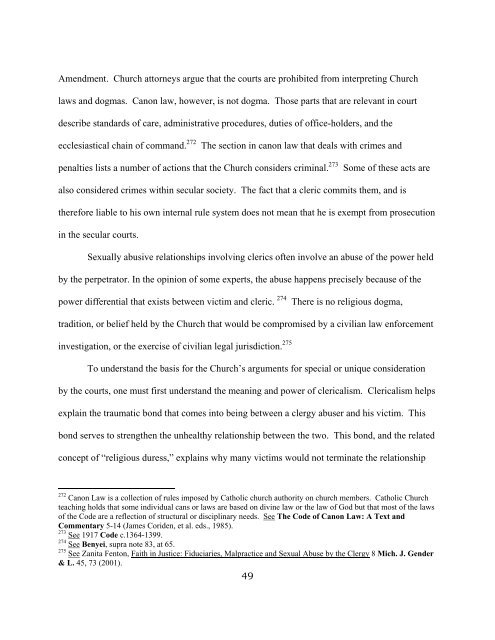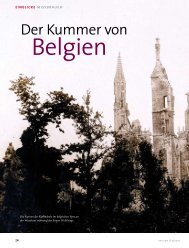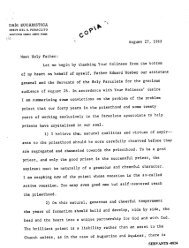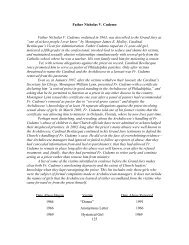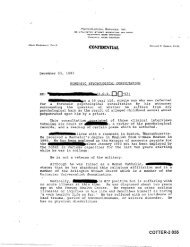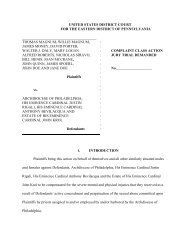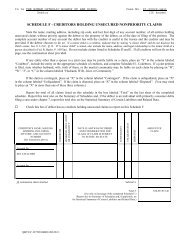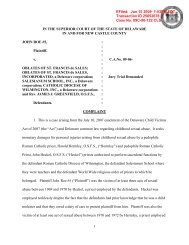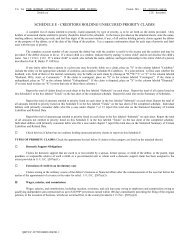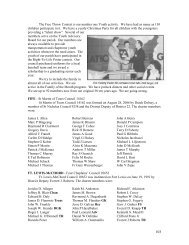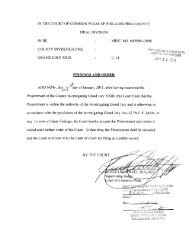1 1 Catholic Clergy Sexual Abuse Meets the Civil Law by Thomas P ...
1 1 Catholic Clergy Sexual Abuse Meets the Civil Law by Thomas P ...
1 1 Catholic Clergy Sexual Abuse Meets the Civil Law by Thomas P ...
You also want an ePaper? Increase the reach of your titles
YUMPU automatically turns print PDFs into web optimized ePapers that Google loves.
Amendment. Church attorneys argue that <strong>the</strong> courts are prohibited from interpreting Church<br />
laws and dogmas. Canon law, however, is not dogma. Those parts that are relevant in court<br />
describe standards of care, administrative procedures, duties of office-holders, and <strong>the</strong><br />
ecclesiastical chain of command. 272 The section in canon law that deals with crimes and<br />
penalties lists a number of actions that <strong>the</strong> Church considers criminal. 273 Some of <strong>the</strong>se acts are<br />
also considered crimes within secular society. The fact that a cleric commits <strong>the</strong>m, and is<br />
<strong>the</strong>refore liable to his own internal rule system does not mean that he is exempt from prosecution<br />
in <strong>the</strong> secular courts.<br />
<strong>Sexual</strong>ly abusive relationships involving clerics often involve an abuse of <strong>the</strong> power held<br />
<strong>by</strong> <strong>the</strong> perpetrator. In <strong>the</strong> opinion of some experts, <strong>the</strong> abuse happens precisely because of <strong>the</strong><br />
power differential that exists between victim and cleric. 274 There is no religious dogma,<br />
tradition, or belief held <strong>by</strong> <strong>the</strong> Church that would be compromised <strong>by</strong> a civilian law enforcement<br />
investigation, or <strong>the</strong> exercise of civilian legal jurisdiction. 275<br />
To understand <strong>the</strong> basis for <strong>the</strong> Church’s arguments for special or unique consideration<br />
<strong>by</strong> <strong>the</strong> courts, one must first understand <strong>the</strong> meaning and power of clericalism. Clericalism helps<br />
explain <strong>the</strong> traumatic bond that comes into being between a clergy abuser and his victim. This<br />
bond serves to streng<strong>the</strong>n <strong>the</strong> unhealthy relationship between <strong>the</strong> two. This bond, and <strong>the</strong> related<br />
concept of “religious duress,” explains why many victims would not terminate <strong>the</strong> relationship<br />
272<br />
Canon <strong>Law</strong> is a collection of rules imposed <strong>by</strong> <strong>Catholic</strong> church authority on church members. <strong>Catholic</strong> Church<br />
teaching holds that some individual cans or laws are based on divine law or <strong>the</strong> law of God but that most of <strong>the</strong> laws<br />
of <strong>the</strong> Code are a reflection of structural or disciplinary needs. See The Code of Canon <strong>Law</strong>: A Text and<br />
Commentary 5-14 (James Coriden, et al. eds., 1985).<br />
273<br />
See 1917 Code c.1364-1399.<br />
274<br />
See Benyei, supra note 83, at 65.<br />
275<br />
See Zanita Fenton, Faith in Justice: Fiduciaries, Malpractice and <strong>Sexual</strong> <strong>Abuse</strong> <strong>by</strong> <strong>the</strong> <strong>Clergy</strong> 8 Mich. J. Gender<br />
& L. 45, 73 (2001).<br />
49


